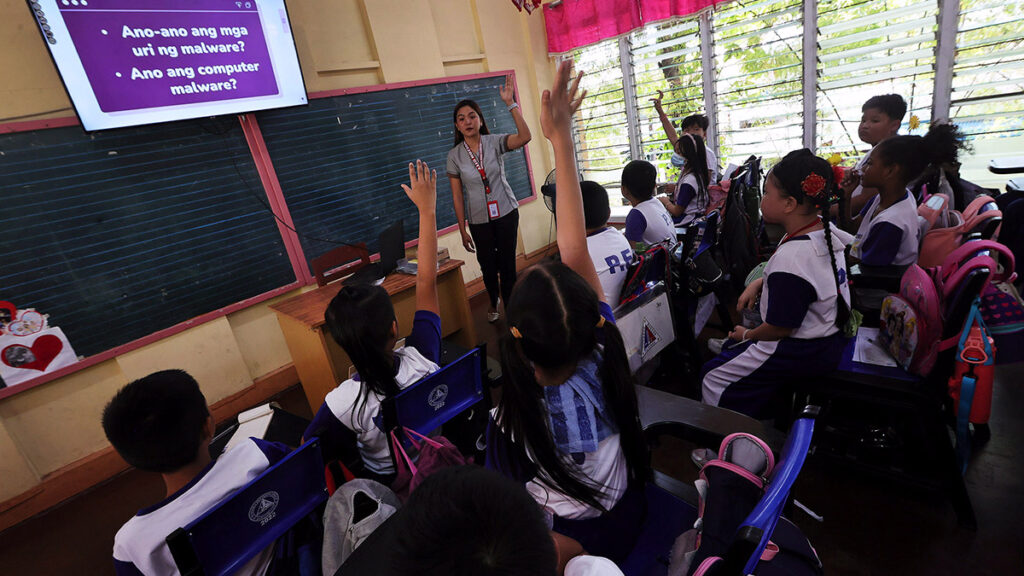June school opening in 2025: DepEd all set to implement it

CALENDAR SHIFT Grade school students attend class at General Roxas Elementary School in Quezon City in this photo taken in February as the country reels from the impact of extreme heat due to the El Niño. The Department of Education says schools will transition to the old academic calendar that sets class opening in June. —Grig C. Montegrande
MANILA, Philippines — The Department of Education (DepEd) plans to open school year 2024-2025 on July 29 and end it on March 31 next year.
This would mean that the old school calendar that would begin in June might come sooner than expected.
This will mark the acceleration of the DepEd timetable and pave the way for the June opening of the 2025-2026 school year.
Last February, DepEd announced the gradual return of the old calendar. Under Department Order No. 003 S. of 2024, the 2024-2025 school year was supposed to run from July 29 to May 16, 2025.
READ MORE:
June opening possible with shorter school calendar, says teacher’s group
DepEd mulls holding of classes on certain Saturdays
Thus, this “aggressive shift” to the old school calendar will mean that this coming school year will just have 163 days, short of the usual 180 days.
To make up for the shortfall, DepEd is considering to hold Saturday classes, DepEd-Bureau of Learning Delivery chief Leila Areola informed the House of Representatives’ committee on basic education and culture in a hearing on Monday.
Pasig City Rep. Roman Romulo, panel chair, welcomed DepEd’s move, saying that the plan to revert to the old school calendar was a response to the sweltering heat during the summer months.
“Again, so we would be clear, this is the fault of nobody but it truly is hot,” said Romulo. “Our students and teachers are experiencing difficulty. It is good that DepEd has this aggressive push to return to the old school calendar.”
Makeup classes
As for the makeup Saturday classes, Areola said the bureau still needed to consult teachers and learners, but stressed that these classes would not be automatically held every Saturday.
“There will just be certain Saturdays that we need to conduct, for example, distance learning so that we’ll be able to cover the competencies that might not be covered with the reduction of the school year,” said Areola.
She also revealed that there was actually no law that sets a minimum number of school days although Republic Act No. 11480 and RA 7797 set a maximum number of 220.
“When we take a look at the number of school days from school year 1993-1994 to the present, the average number of school days is 203,” said Areola, “[But] when the curriculum was prepared, they calculated the 180 days as much as possible to be the minimum number of school days.”
Areola said that in case Saturday classes would be required, DepEd would be ready with the learning materials, such as the self-learning modules developed during the COVID-19 pandemic that could be used by students on distance learning. Education Undersecretary Michael Poa said earlier that the decision to revert to the old academic calendar was based on “what majority of Filipinos want” and “to go back to April-May [break],” citing surveys and the results of their own field consultations.
READ MORE:
READ MORE:
Extreme Heat as a ‘New Pandemic’: Thousands in PH Cancel Classes During ‘Hottest Year’
Scorching schools: How heat worsens conditions of poor students in PH
On April 10, 2024, amid the intense heat experienced by the Philippines, President Ferdinand Marcos Jr. vowed to find a way for the government to complete the transition to the old school calendar earlier than planned.
Classes in different parts of the country have been suspended while some have shifted to online learning instead of in-person over the intense heat caused by the combined effects of a strong El Niño and the onset of the summer season.
The President conceded that the government was caught off guard by the recent changes in temperature, upsetting plans for an earlier school opening in June.
Along with Marcos, several teachers’ groups, including the Alliance of Concerned Teachers and Teachers’ Dignity Coalition, have urged DepEd to immediately shift back to the old academic calendar. —with a report from Inquirer Research
Disclaimer: The comments uploaded on this site do not necessarily represent or reflect the views of management and owner of Cebudailynews. We reserve the right to exclude comments that we deem to be inconsistent with our editorial standards.
